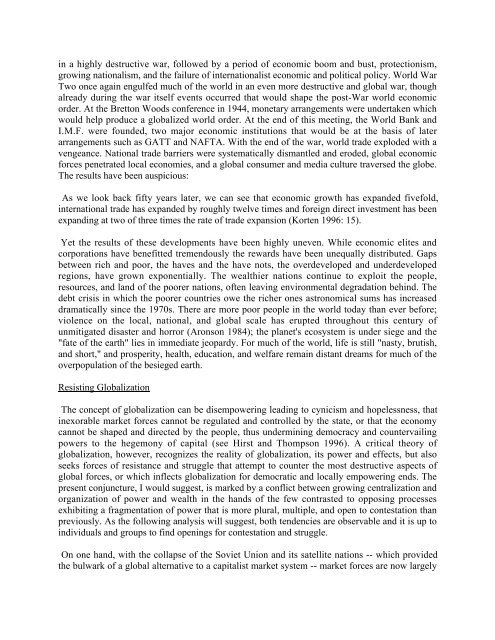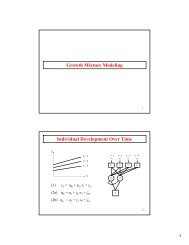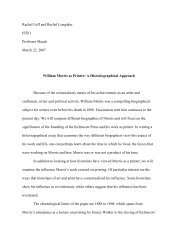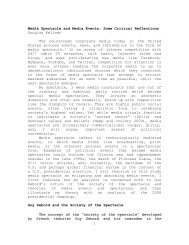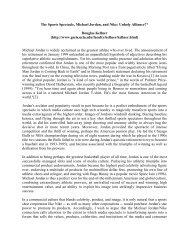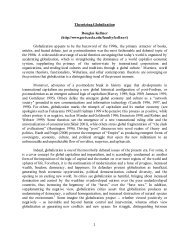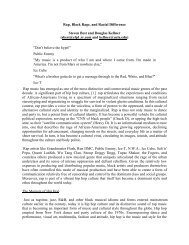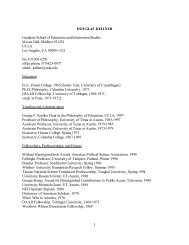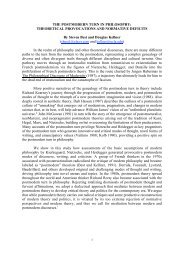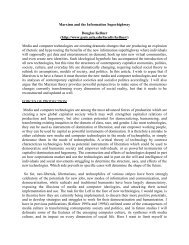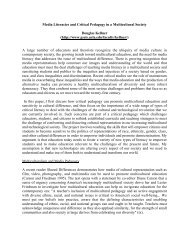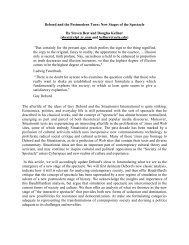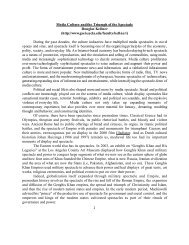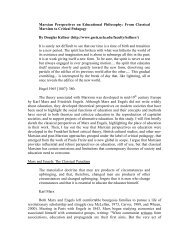Globalization and the Postmodern Turn By Douglas Kellner ... - UCLA
Globalization and the Postmodern Turn By Douglas Kellner ... - UCLA
Globalization and the Postmodern Turn By Douglas Kellner ... - UCLA
You also want an ePaper? Increase the reach of your titles
YUMPU automatically turns print PDFs into web optimized ePapers that Google loves.
in a highly destructive war, followed by a period of economic boom <strong>and</strong> bust, protectionism,<br />
growing nationalism, <strong>and</strong> <strong>the</strong> failure of internationalist economic <strong>and</strong> political policy. World War<br />
Two once again engulfed much of <strong>the</strong> world in an even more destructive <strong>and</strong> global war, though<br />
already during <strong>the</strong> war itself events occurred that would shape <strong>the</strong> post-War world economic<br />
order. At <strong>the</strong> Bretton Woods conference in 1944, monetary arrangements were undertaken which<br />
would help produce a globalized world order. At <strong>the</strong> end of this meeting, <strong>the</strong> World Bank <strong>and</strong><br />
I.M.F. were founded, two major economic institutions that would be at <strong>the</strong> basis of later<br />
arrangements such as GATT <strong>and</strong> NAFTA. With <strong>the</strong> end of <strong>the</strong> war, world trade exploded with a<br />
vengeance. National trade barriers were systematically dismantled <strong>and</strong> eroded, global economic<br />
forces penetrated local economies, <strong>and</strong> a global consumer <strong>and</strong> media culture traversed <strong>the</strong> globe.<br />
The results have been auspicious:<br />
As we look back fifty years later, we can see that economic growth has exp<strong>and</strong>ed fivefold,<br />
international trade has exp<strong>and</strong>ed by roughly twelve times <strong>and</strong> foreign direct investment has been<br />
exp<strong>and</strong>ing at two of three times <strong>the</strong> rate of trade expansion (Korten 1996: 15).<br />
Yet <strong>the</strong> results of <strong>the</strong>se developments have been highly uneven. While economic elites <strong>and</strong><br />
corporations have benefitted tremendously <strong>the</strong> rewards have been unequally distributed. Gaps<br />
between rich <strong>and</strong> poor, <strong>the</strong> haves <strong>and</strong> <strong>the</strong> have nots, <strong>the</strong> overdeveloped <strong>and</strong> underdeveloped<br />
regions, have grown exponentially. The wealthier nations continue to exploit <strong>the</strong> people,<br />
resources, <strong>and</strong> l<strong>and</strong> of <strong>the</strong> poorer nations, often leaving environmental degradation behind. The<br />
debt crisis in which <strong>the</strong> poorer countries owe <strong>the</strong> richer ones astronomical sums has increased<br />
dramatically since <strong>the</strong> 1970s. There are more poor people in <strong>the</strong> world today than ever before;<br />
violence on <strong>the</strong> local, national, <strong>and</strong> global scale has erupted throughout this century of<br />
unmitigated disaster <strong>and</strong> horror (Aronson 1984); <strong>the</strong> planet's ecosystem is under siege <strong>and</strong> <strong>the</strong><br />
"fate of <strong>the</strong> earth" lies in immediate jeopardy. For much of <strong>the</strong> world, life is still "nasty, brutish,<br />
<strong>and</strong> short," <strong>and</strong> prosperity, health, education, <strong>and</strong> welfare remain distant dreams for much of <strong>the</strong><br />
overpopulation of <strong>the</strong> besieged earth.<br />
Resisting <strong>Globalization</strong><br />
The concept of globalization can be disempowering leading to cynicism <strong>and</strong> hopelessness, that<br />
inexorable market forces cannot be regulated <strong>and</strong> controlled by <strong>the</strong> state, or that <strong>the</strong> economy<br />
cannot be shaped <strong>and</strong> directed by <strong>the</strong> people, thus undermining democracy <strong>and</strong> countervailing<br />
powers to <strong>the</strong> hegemony of capital (see Hirst <strong>and</strong> Thompson 1996). A critical <strong>the</strong>ory of<br />
globalization, however, recognizes <strong>the</strong> reality of globalization, its power <strong>and</strong> effects, but also<br />
seeks forces of resistance <strong>and</strong> struggle that attempt to counter <strong>the</strong> most destructive aspects of<br />
global forces, or which inflects globalization for democratic <strong>and</strong> locally empowering ends. The<br />
present conjuncture, I would suggest, is marked by a conflict between growing centralization <strong>and</strong><br />
organization of power <strong>and</strong> wealth in <strong>the</strong> h<strong>and</strong>s of <strong>the</strong> few contrasted to opposing processes<br />
exhibiting a fragmentation of power that is more plural, multiple, <strong>and</strong> open to contestation than<br />
previously. As <strong>the</strong> following analysis will suggest, both tendencies are observable <strong>and</strong> it is up to<br />
individuals <strong>and</strong> groups to find openings for contestation <strong>and</strong> struggle.<br />
On one h<strong>and</strong>, with <strong>the</strong> collapse of <strong>the</strong> Soviet Union <strong>and</strong> its satellite nations -- which provided<br />
<strong>the</strong> bulwark of a global alternative to a capitalist market system -- market forces are now largely


